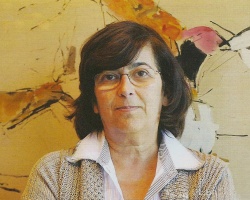
Image Credit: Fundação Calouste Gulbenkian
Luisa Valle, Director for the Human Development Program by Gulbenkian, uses her hands to underline the words that move out slower than her thought. We met her at the end of a day, in her sunny lit-office with a view to the well-arranged gardens of the Gulbenkian Foundation. This was the scenario that inspired an interview by commencing with the project Ideias de Origem Portuguesa-IOP (Ideas of Portuguese origin) and ending by discussing the state of the country and the entrepreneurial capacity of the Portuguese here and abroad. It was to these 5 million emigrants that the IOP, created by the Calouste Gulbenkian Foundation in a partnership with the Fundação Talento (“Talent Foundation”) made the challenge: 203 people took up the call with Social Entrepreneurship projects to be developed in Portugal. The ten best ideas have already been chosen and will have support for its implementation.
Why an initiative of Entrepreneurship addressed to the Portuguese abroad?
Because we are undergoing a challenging phase of great crisis in the country. We all feel somewhat lost and in the middle of this all, we fail to remember that we aren’t just ten million Portuguese. We are, at least five more million living outside, scattered throughout the world. We admit that it would be very interesting to build bridges from all this knowledge and all this love felt between the diaspora and Portugal. In being united, we will stand a much better chance in finding answers and solutions.
What is the fundamental objective: to put people to think or to have them take action by putting their ideas in practice?
I would say it’s a little of both. We are asking for people from outside to reflect on this country, because they are less emotionally attached, thus taking a more rational approach and consequently, having better ideas. In addition, we are asking for these people to get ideas and innovative knowledge from the experience that they are living to apply them in Portugal.

What is a good idea?
When we are talking of noteworthy ideas, we mean innovation, motivation and viability. There are some wonderful ideas available that depend on so many factors and resources, that aren’t feasible in the context of this initiative.
Once the best ideas are chosen, how is it ensured that they are put to practice?
This is the great dream behind all of this. We will provide mentoring to the ten best ideas. The winning project will be awarded 50.000 euros by the foundation. Regarding the other distinguished ideas, there is a strong desire for us to participate in the process to try to find financial backers as well.
The preferred medium used for spreading the message is the Internet by means of Social Media, using Facebook and Twitter, which has the most acceptance by the younger generation. Does this mean that the answers are to be found among young people?
Not necessarily. I consider myself a creative type, I have ideas, but I’m not exactly a missy. The young people are those who can and will make a commitment vis-à-vis this subject because it relates with their future, much more than it does with the older generation. I believe that the Millennial generation which is presently attending university has a much greater citizenship awareness than their parents and grandparents do. This is the first Portuguese generation that takes on this sense of responsibility. Until then, all these matters were taken in charge by the state and the responsibility was always of the others. Surely there are some notable exceptions, but the great majority thought this way. My understanding is that this youth is more disengaged from politics, nonetheless having a strong social conscience regarding the environment, solidarity, development, aiding the needy and all the great causes that characterize our society.
In launching a project like this, we don’t want to leave anyone out, but we feel that the target that would have a greater response by far is from the young population, reason why we have adopted Social Media as our preferred communication vehicle.
The IOP had 203 participants. Does completion represent the crux of the matter for the Portuguese? Because as we can see, there is no shortage of ideas.
We do struggle with planning, we are very bureaucratic and many times we only feel motivated when time is running out, therefore when we carry out something, it’s always in a haste. But we have a great capacity of figuring out a last-minute solution and this capacity of responding at the eleventh hour when others are incapable, is a quality that we have (in Portuguese, the appropriate word for this advantage is “desenrascanço”).
We know how to disentangle ourselves out of bad situations. Are we entrepreneurial, as well?
Surely we are entrepreneurial but we don’t have an entrepreneurial culture. What I mean is that we have this capacity locked in our genes. We have an adventurous spirit. Through the ages we have always managed to find a way to bounce back when falling off a wagon. These are acts of courage, it’s the capacity to change things – it is Entrepreneurship. But along the way we went on losing this spirit. Now we have the necessity to become Entrepreneurs, because we are compelled to do so, like for example, with the loss of a job. It doesn’t happen because we wake up one morning decided to create our own job. We should drink this culture at home in a nursing bottle within our family and at school as well. Things are changing, but until recently we were raised to work for others and not to choose our own destinies.
Many times people don’t take their destinies in their hands because they are afraid to fail. This is not a specific characteristic of the Portuguese, it is the European culture: we don’t tolerate failures and errors. Somebody who adventures into the Entrepreneurial world and fails becomes immediately labeled. It will be very difficult for him/her to get accepted by society and by the banks because of the loss of credibility. That person feels ashamed as well. If you head to the United States, the culture is quite different. For them it is perfectly natural and acceptable than they don’t get it at first. Moreover, somebody who  experiences failure and comes back later will a well thought out idea and with the courage of going back to square one and starting it all over is very esteemed. These are societies that create the necessary conditions for people to become Entrepreneurs. Error and defeat can be important educational factors that allow for a second experience with much more ambition and with a much greater success rate. The paradigm is that to achieve success, people have to be aware that they might stumble upon several difficulties. These obstacles are in fact blessings in disguise.
experiences failure and comes back later will a well thought out idea and with the courage of going back to square one and starting it all over is very esteemed. These are societies that create the necessary conditions for people to become Entrepreneurs. Error and defeat can be important educational factors that allow for a second experience with much more ambition and with a much greater success rate. The paradigm is that to achieve success, people have to be aware that they might stumble upon several difficulties. These obstacles are in fact blessings in disguise.
Is the crisis that we are undergoing a good time to take this step?
Those who like to read and know one thing or two about history, understand that moments of crisis like this one are also moments of big opportunities. This is so because it is the right time to break with the past and start something new. We must have the will and the strength to take advantage of this moment and not let it pass by. This is a plea that I do every day at home and at work: we cannot fall asleep. We will undergo stressful times, moments that will test our resilience, our capacity of survival and our ability of maintaining our humanitarian selves alive, because this is what we must practice the most as human beings– to be helpful to one another. Let us hope that we can maintain our humanity and solidarity and put at the service of this country our imagination, resourcefulness and ability to break with habits and processes. We must reevaluate everything. Over the years we have confused happiness with having. We will be forced to live with less. Instead, we must value the wonderful people that our country has, the security, the sun, a history that we can be proud of and were we can get teachings, energy and strength to move ahead and build our future. We cannot keep our arms crossed and wait for some Dom Sebastião (heir to the throne of Portugal in the 16th century, aka “The Desired”) or for a President of some party to provide us with the answers. We must take the responsibility and search for the answers ourselves. We must actively participate in citizenship and attend the calling when we are asked to. This is why we must believe in ourselves, because there are ideas aplenty, not only in the Ideias de Origem Portuguesa-IOP. We must find strength from within and put these ideas to good use.
You can view the ideas presented by the 10 finalists in the IOP site and obtain updates in their Facebook page.
Article written by Sofia Simões de Almeida from Lead Magazine, which was originally published in their first edition/September’11 and translated under permission by BestInPortugal.
Image credits for Luisa Valle: Fundação Calouste Gulbenkian
